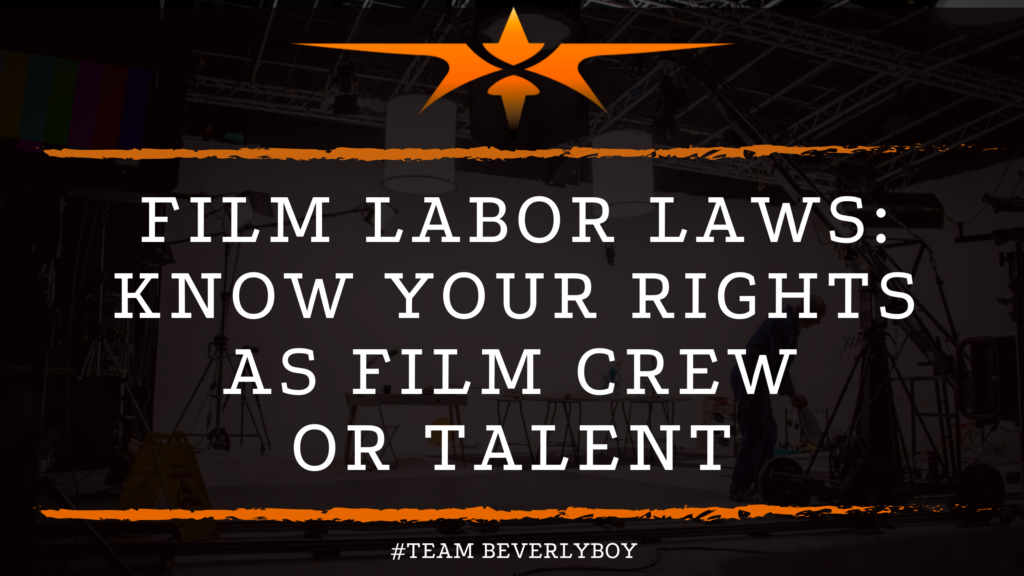Film Labor Laws: Know Your Rights as Film Crew or Talent
Few filmmakers have a background in law, business or business law for the matter. In fact, it’s very common for those who enter the film industry to spend a lot of time learning about film and television production. But rarely do they tackle college level coursework in business law. Or even in film law for that matter. So what is a film crew member, such as a camera operator, or a performer such as an actor supposed to do if they find that film labor laws? Which might apply to them are not being followed?

More importantly, do you know the film labor laws which apply to you or someone you’re working with on the film set? Or, if you’re a filmmaker, are you aware of the film labor laws?
Which apply to the contractors and employees that you hire to work on the set. As well as to the talented performers involved in your production? What about hiring minor workers?
Film Labor Laws and Internships
Internships provide a unique opportunity both for the individual that’s brought into the business to learn and assist. And for the production company that hires the intern.
However, back in the early 2000s it was customary to bring volunteer workers into the film industry. And call them “unpaid interns” thus they wouldn’t be paid.
Unpaid Interns
Film labor laws that have been established since then. Making it illegal for production companies to have interns that are “Unpaid”. Which do not meet several other important characteristics relative to internships. An internship is not just someone that works for free.
Interns must be directly tied to academic programs. Such that they are providing work in exchange for the education that they are learning through the production company in the process.
So before you go hiring an “intern” and thinking you can get away with not paying just anyone under the sun. Think again!
And, if you were hired as an “unpaid intern” that is not involved in any college or other form of academic program? You could be a victim of a company that is breaking film labor laws.
Wages & Hours in the Film Industry
Film producers must follow local state and federal film labor laws as they apply to minimum wage, overtime hours, and the working conditions involved on set and off.
If you’re an employer, providing gainful employment for a crew of film production professionals. It’s important for you to follow all wage and hour laws.
This means that you’re going to have to be sure to abide by the laws set forth by the unions. That your crew may be members of in addition to all other applicable film labor laws.
It’s likely that you’ll be required to pay out a particular minimum hourly rate. Overtime pay that is 1.5 times the hourly rate or more. And follow various other rules. Check with your local labor force and with the union to determine the laws for the area in which you’re filming.
Employees vs. Contractor Labor
As you navigate film labor laws it’s also important for you to understand whether or not you’re an employee or a contractor. Or whether or not you’ve hired an employee or a contractor.
The rules and regulations, both in the industry and state-to-state, vary based on the type of employment involved. Contractors have distinctly different rights. Including the right to dictate much of how they perform tasks.
As well as the right to maintain ownership of copyright. Unless specific details dictating a work-for-hire agreement are included in the contract.
Criteria
Likewise, employees must abide by many of the rules regarding hours and how tasks are performed as they are set forth by the hiring company.
But if you’re an employee, or a company seeking to hire employees. It’s important to understand that you can’t just say “I’m an employee” or “you’re an employee” and make all applicable film labor laws for employees automatically apply.
In order to actually be an employee, the individual must:
- Have an employee relationship with the film producer.
- Have workman’s compensation insurance that is paid for by the film company.
- Receive company benefits that are paid to other employees.
Child Labor Laws in Film

Along with the many different film labor laws that apply to adults. Child labor laws are also important for filmmakers and performers in the industry to understand.
Since children are technically not able to enter into a contracted agreement for employment or for freelance work, the consent to work on a film would need to come from the child’s parent or legal guardian.
In addition to consent, the following child labor laws apply to the film industry:
- Most states have specific details regarding working hours.
- Turnaround times are set by state and generally require at least 12 hours.
- Age limits are in place from state-to-state and many will not allow children under 6 weeks old to be child performers. State film labor laws for minors vary otherwise.
- Many states require that part of a minor talent salary be held in a protected trust until the minor turns 18.
Profit Participation Laws
It’s common for film employees to accept deals that extend their compensation out until the film matures and is distributed. If you’re thinking of entering into a profit participation agreement in lieu of immediate employee compensation.
It’s important for you to familiarize yourself with the film labor laws which apply to scenarios like this. Particularly, you should still make minimum wage for your time involved on the set. But profit sharing arrangements above and beyond the minimum wage may be accepted.
You might be asked to work on the film in exchange for future profits. You may also be asked to become a limited partner or a corporate shareholder.
However, in most states employees are still entitled to a minimum wage. As well as to overtime pay for the time they’re working on the film regardless of any shareholder agreement that is made. Keep this in mind if such a deal is offered to you!
The Takeaway
As you can see, film labor laws for talent and crew are largely based on the state. In which the production is filmed in and the type of employment. Sometimes called freelancers or otherwise referred to as contractors.
Contracted workers are under completely different regulations than employed workers or employees. Because of this, it is incredibly important both for film producers and for film workers to understand how to distinguish between a contract worker and an employee.
Without this understanding, it’s very easy to get yourself as a hiring production manager into trouble. And if you’re an employee, you could be losing important rights. This is why it is important for you as a film professional to understand film labor laws and your rights.


